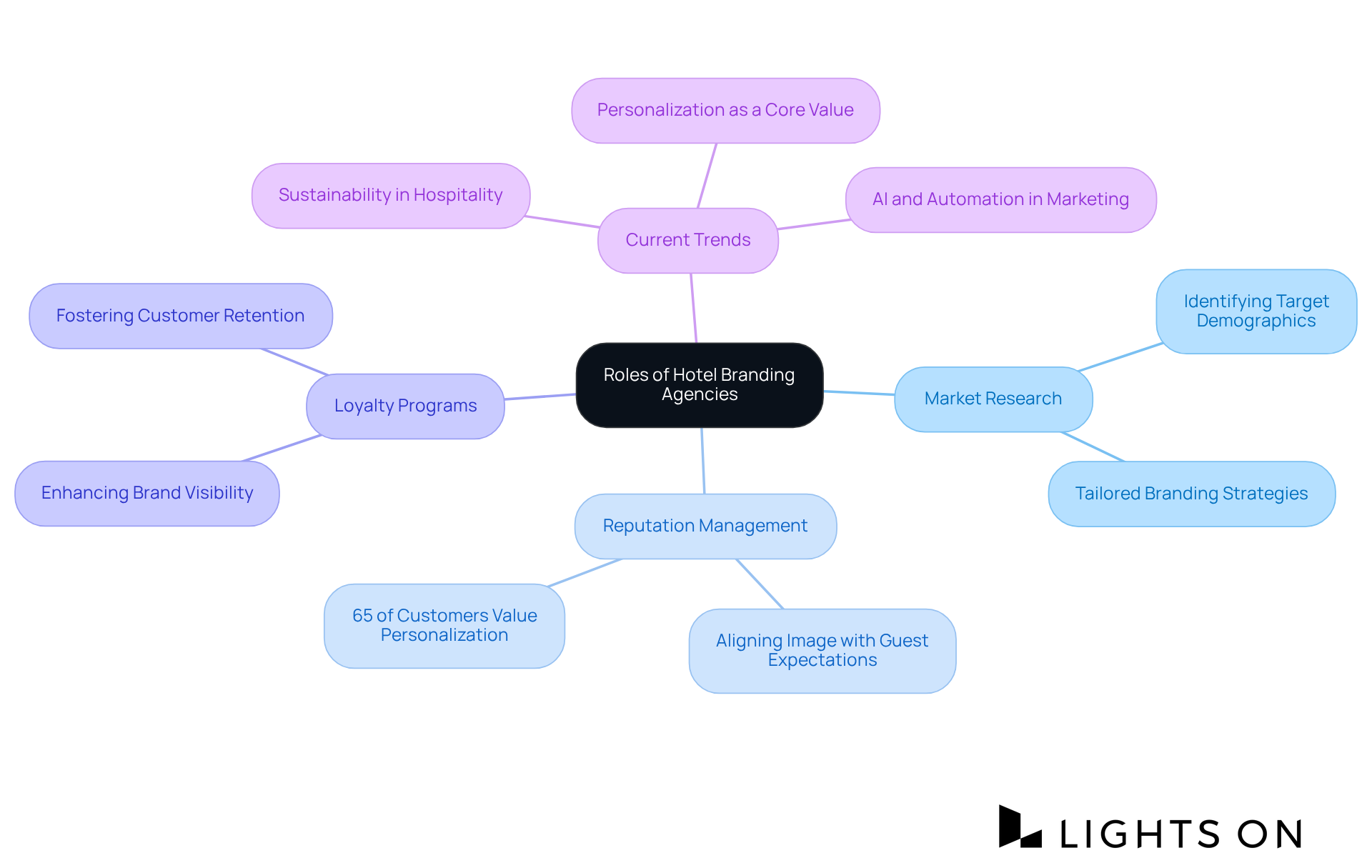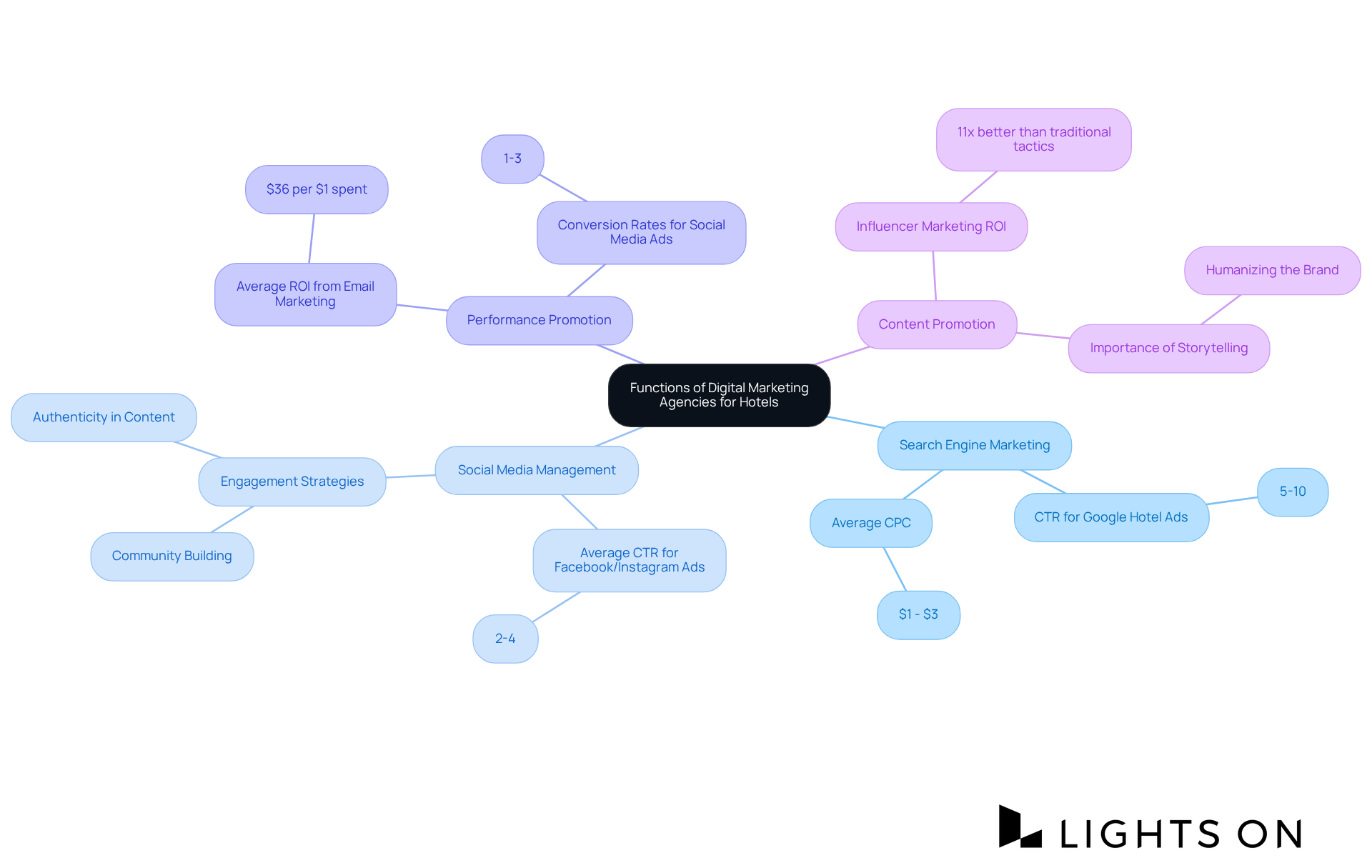The key differences between a hotel branding agency and a digital marketing agency are rooted in their focus and outcomes.
This distinction is crucial for hotel owners.
Therefore, the choice between these two types of agencies ultimately depends on a hotel’s specific goals, whether they seek to build a lasting brand or drive immediate bookings.
The hospitality industry is experiencing a significant transformation, where the distinction between hotel branding and digital marketing has become increasingly pronounced. For hotel owners seeking to enhance their market presence and attract loyal customers, understanding these differences is essential.
This article explores the unique roles that hotel branding agencies and digital marketing firms play in shaping a hotel's identity and driving bookings. Each approach has the potential to either complement or compete with the other.
As hotels navigate this complex landscape, a critical question arises: which strategy should they prioritize to achieve sustainable growth and foster customer loyalty?
A hotel branding agency represents a strategic endeavor to craft a distinctive identity and image for a venue, encapsulating its core values, mission, and the overall visitor experience. This identity is crucial for differentiation in a competitive market, significantly shaping customer perceptions and fostering loyalty. Effective marketing not only influences how visitors view an establishment but also impacts their reservation decisions. Research indicates that a compelling narrative can strengthen emotional connections and instill confidence. For instance, accommodations that adeptly implement personalization strategies have reported revenue growth ranging from 10% to 30%, underscoring the financial benefits of a well-defined identity.
Conversely, digital promotion leverages online platforms and tools to bolster a hotel’s brand, drive traffic, and enhance bookings. This encompasses strategies such as:
While branding focuses on cultivating long-term identity and emotional ties with guests, digital promotion emphasizes immediate engagement and conversion through targeted campaigns. Both components are vital for a lodging establishment's success, yet they fulfill distinct roles within the overarching marketing strategy.
The importance of lodging branding in fostering customer loyalty is paramount. A cohesive identity not only attracts visitors but also encourages repeat reservations, as customers are more likely to return to an establishment that resonates with their values and expectations. In a landscape where 44% of consumers assert that loyalty programs influence their accommodation choices, establishing a robust presence becomes a competitive edge. Furthermore, 88% of visitors consider the eco-friendly practices of accommodations when making reservations, highlighting the necessity for businesses to align with consumer values. Effective hotel promotion strategies, such as those implemented by a hotel branding agency like Lights On, can significantly boost bookings and revenue management. For example, Lights On has successfully utilized targeted social media campaigns and personalized email outreach to engage potential visitors, resulting in enhanced brand recognition and improved conversion rates. Case studies, such as Novotel's success in China through a focus on family-friendly services, demonstrate how tailored branding can effectively address market demands and elevate guest satisfaction. Ultimately, the integration of with effective digital promotion strategies is essential for establishments aiming to thrive in today's dynamic hospitality landscape.

The role of a hotel branding agency is vital in shaping and managing a property's identity. They begin by conducting thorough market research to identify target demographics, which informs the development of tailored branding strategies. This process involves creating guidelines that define the establishment's voice, visual components, and overall ethos, ensuring consistency across all promotional materials.
A significant aspect of their work as a hotel branding agency involves reputation management, where they ensure that the hotel’s image aligns with guest expectations and experiences. This focus is increasingly crucial, as 65% of customers view as a key element in their experience, underscoring the necessity for companies to connect meaningfully with their audience.
Hotel branding agencies also assist in developing loyalty programs and strategic partnerships that enhance brand visibility and foster customer retention. For instance, successful projects like the rebranding of Value Place to WoodSpring resulted in a 21% increase in RevPAR, showcasing the tangible benefits of effective branding.
Current trends indicate that accommodation branding is evolving to incorporate sustainability and personalization. Visitors are increasingly seeking eco-friendly practices and tailored experiences. As the hospitality environment becomes more competitive, a hotel branding agency is essential for robust branding, enabling accommodations to stand out and establish enduring relationships with visitors. By utilizing creative strategies and insights, branding firms help accommodations establish a strong, recognizable identity that not only attracts visitors but also fosters loyalty over time.

Digital advertising firms play a pivotal role in promoting hotels through the services of a hotel branding agency across diverse online channels. They engage in search engine promotion (SEM), a critical strategy for enhancing visibility on search engines, and manage social media to connect with potential guests. By leveraging performance promotion, these agencies drive conversions through targeted advertising, ensuring that every dollar spent yields a high return on investment. For example, well-optimized email campaigns can generate an impressive average return of $36 for every $1 spent, highlighting their effectiveness in the hospitality sector.
Agencies utilize a variety of techniques, such as content promotion and influencer collaborations, to broaden their reach and enhance brand visibility. With approximately 35-40% of travelers using for accommodation discovery, a strategic focus on these channels is essential for optimizing bookings. Furthermore, the average click-through rate (CTR) for Google Hotel Ads ranges from 5-10%, significantly outperforming traditional display ads, which generally see lower engagement rates.
The primary goal of a hotel branding agency is to enhance online presence and increase reservations, making it indispensable for accommodations aiming to excel in an increasingly competitive digital landscape. By analyzing data and refining campaigns, these agencies ensure that promotional efforts are not only effective but also aligned with the evolving preferences of travelers.

When evaluating a hotel branding agency against , distinct advantages and disadvantages emerge clearly.
Hotel Branding Agencies:
Pros:
Digital Marketing Agencies:
Pros:
Ultimately, the decision between a hotel branding agency and a digital marketing agency hinges on specific objectives—whether the focus is on fostering lasting brand growth or achieving prompt online visibility and bookings. As industry experts emphasize, understanding the unique needs of the hotel can effectively guide this choice.

The exploration of hotel branding agencies and digital marketing underscores their crucial yet distinct roles within the hospitality industry. Hotel branding is centered on crafting a unique identity that resonates with guests, fostering emotional connections and cultivating long-term loyalty. Conversely, digital marketing prioritizes immediate engagement and conversion through strategic online campaigns, ensuring visibility and bookings in an increasingly competitive landscape.
Key insights reveal the significance of a well-defined brand identity in attracting and retaining customers, alongside the effectiveness of targeted digital strategies that drive traffic and enhance revenue. Successful case studies illustrate how tailored approaches can profoundly impact guest satisfaction and overall business performance.
Ultimately, the decision between engaging a hotel branding agency or a digital marketing agency should align with the specific goals of the establishment. Whether the aim is sustainable brand growth or immediate online visibility, understanding these distinctions is essential for making informed decisions that will shape the future success of a hotel. By embracing both branding and digital marketing strategies, hotels can create a powerful synergy, ensuring they not only stand out but also thrive in an ever-evolving market.
What is the role of a hotel branding agency?
A hotel branding agency is responsible for crafting a distinctive identity and image for a hotel, which encapsulates its core values, mission, and overall visitor experience, helping to differentiate it in a competitive market.
How does hotel branding influence customer perceptions?
Hotel branding significantly shapes how customers perceive an establishment, fostering loyalty and influencing their reservation decisions through the creation of a compelling narrative that strengthens emotional connections.
What financial benefits can a well-defined hotel identity bring?
Accommodations that implement effective personalization strategies can report revenue growth ranging from 10% to 30%, highlighting the financial advantages of a strong hotel identity.
What is digital promotion in the context of hotel marketing?
Digital promotion involves leveraging online platforms and tools to enhance a hotel’s brand, drive traffic, and increase bookings through strategies like search engine optimization (SEO), social media outreach, and performance marketing.
How do branding and digital promotion differ in their focus?
Branding focuses on cultivating a long-term identity and emotional ties with guests, while digital promotion emphasizes immediate engagement and conversion through targeted campaigns.
Why is customer loyalty important in hotel branding?
A cohesive hotel identity attracts visitors and encourages repeat reservations, as customers are more likely to return to establishments that align with their values and expectations.
What percentage of consumers are influenced by loyalty programs when choosing accommodations?
44% of consumers assert that loyalty programs influence their accommodation choices.
How do eco-friendly practices affect consumer decisions regarding hotel reservations?
88% of visitors consider the eco-friendly practices of accommodations when making reservations, indicating the importance for hotels to align with consumer values.
What strategies can effectively boost hotel bookings and revenue?
Effective hotel promotion strategies, such as targeted social media campaigns and personalized email outreach, can significantly enhance brand recognition and improve conversion rates.
Can you provide an example of successful hotel branding?
Novotel's success in China, through a focus on family-friendly services, illustrates how tailored branding can effectively meet market demands and elevate guest satisfaction.
Transform your group booking strategies with Lights On and watch your occupancy soar.